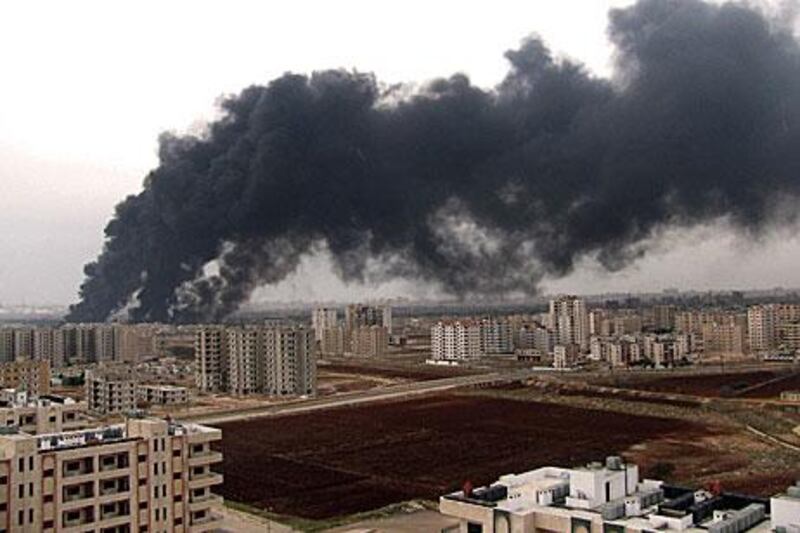A major Syrian pipeline carrying oil to a refinery in Homs province was blown up yesterday in an attack the state-run news agency blamed on "saboteurs" as activists reported fresh violence from the government crackdown.
No one was injured in the blast but a plume of black smoke was sent into the sky. A government official said the blast caused a fire that burnt for hours. "An armed terrorist group on Thursday committed an act of sabotage," the state-run Sana news agency said.
It was not clear who was behind the pipeline explosion at a time when violence in Syria is spiralling out control. The opposition accuses the government of playing on fears of religious extremism and terrorism to rally support behind President Bashar Al Assad, who has portrayed himself as the only force that can stabilise the country.
There were two similar blasts on Syrian pipelines in July and it is still not know who was behind them.
Also yesterday, activists said security forces killed up to 14 people, most of them in Homs. The reports could not be independently confirmed as Syria has banned most foreign journalists from the country and prevented independent reporting.
The government's response has led the US and the European Union to impose additional sanctions against Mr Al Assad's administration, and the effects of the continuing turmoil are cascading throughout the region.
Jordan is seeking to be exempt from imposing Arab League sanctions, the bloc is urging Syria to sign a peace plan immediately while Iraq has agreed to mediate between the Arab League and Syria.
Meanwhile, Syrian activists have called for a nationwide strike on Sunday as the first stage in a campaign of civil disobedience against the government of Mr Al Assad.
The Local Coordination Committees, the grassroots organisers of the peaceful protest movement which began in March, said the campaign would include sit-ins, shop closures and strikes by public service workers and students.
A similar call for a walkout two months ago had mixed results.
On the diplomatic front, the head of the Arab League said yesterday that Syria should sign the bloc's proposed peace plan as soon as possible if it wants to avert economic penalties.
The Arab League secretary general, Nabil Elaraby, said he held talks with officials in Iraq to "explore whether the Iraqi government is willing to exert its influence with Syria" to agree to the Arab plan.
"What we expect is as soon as possible Syria will accept to sign the protocol ... now it is up to Syria, the ball is in the Syrian court," Mr Elaraby said at a joint news conference with Iraqi foreign minister Hoshyar Zebari in Baghdad.
Already hit by economic sanctions imposed by the United States and Europe, Syria now faces further sanctions from Arab nations. Turkey and Jordan are calling on Mr Al Assad to step down, with Ankara imposing 30 per cent duty on imports from Syria in retaliation for a similar tax imposed on Turkish goods.
Iraq, however, has resisted sanctions against Damascus. Officials say they are worried violence in Syria could spill over the border and upset Iraq's delicate sectarian balance.
The Arab League has repeatedly extended deadlines for Syria to agree to a plan that would see Arab monitors oversee its withdrawal of troops from towns. The latest expired on Sunday.
Syria says the Arab proposal infringes on its sovereignty and has asked for clarification.
Mr Elaraby said no new deadline has been set and the Arab League's sanctions took effect on November 27. He also said the League is likely to meet representatives of the Syrian opposition by next week.
Speaking alongside Mr Elaraby, Mr Zebari said Iraq was in talks with both the Syrian government and the opposition to try to end the bloodshed.
In Jordan, the government has asked the League to be exempt from the bloc's sanctions on Syria. Jordan is worried about the toll they will take on the kingdom's ailing economy, a government official said yesterday.
The Arab League imposed economic sanctions on Syria last month to try to pressure Damascus to end its crackdown.
"Jordan supports the Arab consensus regarding the sanctions on Syria, but we have to cater to our economic interests," the official said, insisting on anonymity, citing the sensitivity of the matter.
Syria is one of Jordan's biggest Arab commercial partners, with bilateral trade estimated at US$525 million (Dh1.9bn) in the first nine months of this year. The country also serves as a gateway for Jordan's trade with Lebanon, Turkey and Europe, and Damascus has $500m in deposits in Jordanian banks and multimillion dollar investments here.
Also yesterday, Russia's foreign minister warned that Syrians should be allowed to sort out their country's problems without outside interference.
Syria should follow the example of Yemen, Sergey Lavrov said. Yemeni president, Ali Abdullah Saleh, stepped down recently after a 10-month uprising in exchange for immunity from prosecution.
"Nobody put any very extreme deadlines or ultimatums [on Yemen]. Everybody pulled together and in a couple of months this peace plan was signed," Mr Lavrov said after attending a meeting of Nato foreign ministers. "We believe this method could be applied in other areas including Syria."
The United Nations says more than 4,000 people have died in Syria since the uprising began.
In recent weeks, there have been growing signs of an armed insurgency and mounting sectarian tensions that could push the country towards civil war.
* With additional reporting by Bloomberg News, Associated Press and Reuters





